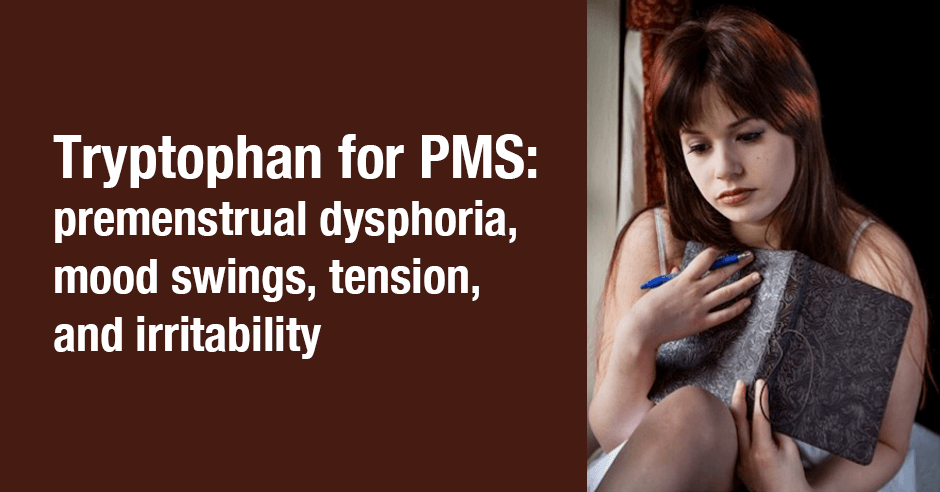
In a study published in 1999, A placebo-controlled clinical trial of L-tryptophan in premenstrual dysphoria, tryptophan was found to reduce symptoms of PMS when used in the luteal phase or second half of the cycle (i.e. after ovulation):
37 patients with premenstrual dysphoric disorder were treated with L-tryptophan 6 g per day, and 34 were given placebo. The treatments were administered under double-blind conditions for 17 days, from the time of ovulation to the third day of menstruation, during three consecutive menstrual cycles.
They looked at dysphoria, which is defined as a state of unease or generalized dissatisfaction with life, plus mood swings, tension (and anxiety), and irritability and they found a 34.5% reduction of symptoms with tryptophan compared to 10.4% with placebo.
The paper concludes:
that these results suggest that increasing serotonin synthesis during the late luteal phase of the menstrual cycle has a beneficial effect in patients with premenstrual dysphoric disorder.
Let me share what I see with the women with PMS that I work with:
- This is very typical when I’m working with someone with PMS and anxiety and other mood symptoms. It typically takes 2 to 3 cycles for an amino acid like tryptophan to have an impact on PMS itself. But it does typically start to work right away on the less severe anxiety and mood symptoms that may also be a factor during the rest of the month.
- I don’t start with 6g per day of the tryptophan but rather have each person do the amino acid questionnaire, review the precautions and do a trial of tryptophan, increasing as needed to find the optimal amount for their needs (you can read more about this here on anxiety and the amino acid overview
- We often find that adding GABA helps too, as this supports progesterone production
- Many anxious women I work with also have pyroluria or signs of low zinc and low vitamin B6 and adding these nutrients, together with evening primrose oil, provide additional hormonal support (and help with the social anxiety).
- Other factors to consider with PMS: low total cholesterol (as cholesterol is needed to make hormones), gluten issues, adrenal function and blood sugar control, gut health and the microbiome, and liver support
- And finally, we can’t forget diet and need to switch to eating a real whole foods diet free from sugar, gluten and caffeine. Coffee and chocolate in the second half of the cycle can be especially problematic for many women
Together with the tryptophan and the above approaches (if needed as we are all so different), it’s not unreasonable to get the reduction of symptoms from 34.5% (as seen with the tryptophan) down to 100%. It breaks my heart when I hear women think they have to live with PMS symptoms when they don’t have to!
Have you used tryptophan for PMS? Do you take it all month or just in the 2nd half of your cycle? What about other changes that have helped: GABA or liver support or quitting caffeine? Or something else? Please share.